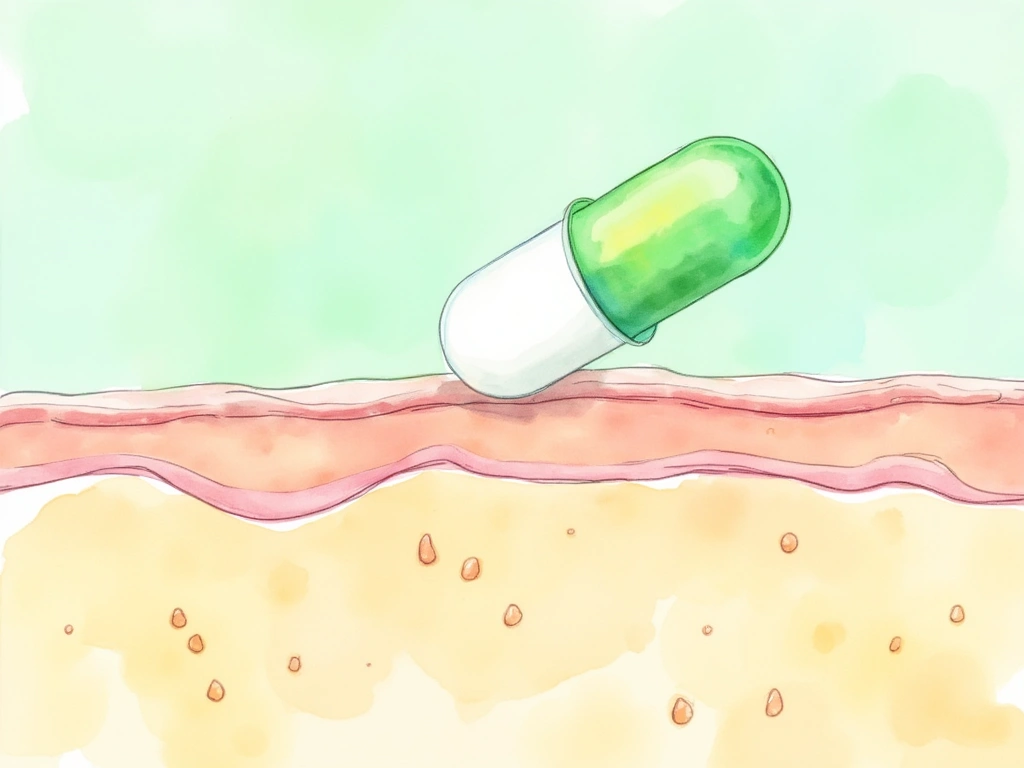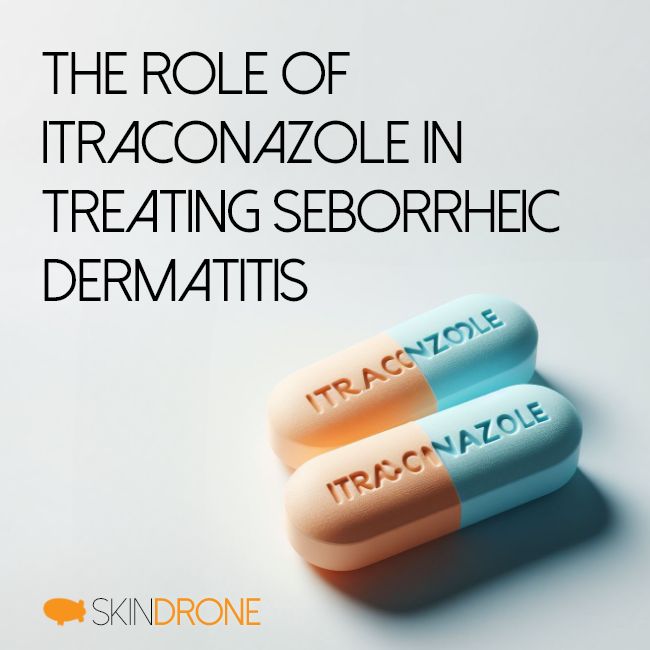This article dives into the role of oral itraconazole, a systemic antifungal medication, as a promising treatment option for those challenging seborrheic dermatitis cases. We’ll explore the science-backed evidence, real-world experiences, and crucial safety aspects to help you understand if itraconazole could be a viable solution for you.
Key Highlights:
- Oral itraconazole is emerging as an effective treatment for moderate to severe seborrheic dermatitis.
- It works by targeting both fungal overgrowth and inflammation, key factors in SD.
- Clinical studies show it can clear lesions, reduce disease severity, and improve quality of life.
- While generally well-tolerated, it’s important to be aware of potential side effects and discuss them with your doctor.
- Patient selection and careful monitoring are crucial for safe and effective use.
TLDR: Oral itraconazole offers a promising treatment avenue for persistent seborrheic dermatitis by addressing both fungal and inflammatory components. Patient screening and awareness of potential side effects are essential for safe use.

Understanding Seborrheic Dermatitis
Seborrheic dermatitis (SD) is a chronic inflammatory skin condition affecting a significant portion of the population, around 3-5% of adults [1]. It manifests as scaly, greasy patches and persistent itching, commonly on the scalp, face, ears, chest, and back [2].
Several interacting factors contribute to the development of seborrheic dermatitis:
- Malassezia Yeast Overgrowth: An excessive presence of Malassezia yeast on the skin [3].
- Excess Sebum: Overproduction of skin oil (sebum) [4].
- Compromised Skin Barrier: Defects in the skin’s protective barrier function [5].
- Inflammation: An inflammatory response in the skin [6].
- Genetic Predisposition: Individual genetic susceptibility [1].
These factors lead to an altered skin microbiome and a cycle of inflammation and impaired barrier function, characteristic of seborrheic dermatitis [3].

Traditional Treatments for Seborrheic Dermatitis
The primary goals of standard seborrheic dermatitis treatments are to reduce yeast overgrowth and control skin inflammation.
Common first-line treatments include:
- Topical Antifungals: Medications like ketoconazole to reduce Malassezia yeast on the skin [7].
- Topical Corticosteroids: Mild steroid creams to lessen inflammation [8].
When topical treatments are insufficient, particularly in moderate to severe cases, systemic options like oral itraconazole may be considered.

How Oral Itraconazole Treats Seborrheic Dermatitis
Itraconazole is an oral antifungal medication belonging to the triazole class. Beyond its antifungal properties, itraconazole also exhibits anti-inflammatory effects, making it potentially beneficial for inflammatory skin conditions like seborrheic dermatitis [9].
Early reports and subsequent clinical studies have indicated the positive impact of oral itraconazole in treating seborrheic dermatitis [Pubby id=”28705278″].
Clinical Benefits of Itraconazole:
Research demonstrates that oral itraconazole can:
- Clear Skin Lesions: Effectively reduce and eliminate seborrheic dermatitis lesions [10].
- Lower Disease Severity: Decrease overall scores that measure the severity of seborrheic dermatitis [11].
- Improve Quality of Life: Significantly enhance patients’ well-being and daily life impacted by SD [12].
- Prevent Recurrence: Help prevent the return of symptoms when used as a maintenance therapy.
Studies even suggest itraconazole may be more effective than oral isotretinoin in treating seborrheic dermatitis [13].
Importantly, short courses of itraconazole (1-2 months) are generally well-tolerated, with most studies reporting minimal side effects [12].
Dual Action Mechanism
Itraconazole’s effectiveness in seborrheic dermatitis is attributed to its combined antifungal and anti-inflammatory actions:
- Antifungal Action: It inhibits fungal growth, reducing the overpopulation of Malassezia yeast on the skin.
- Anti-inflammatory Action: It reduces skin inflammation triggered by fungi and other factors involved in seborrheic dermatitis.
By addressing both fungal load and inflammation, itraconazole allows the skin to heal and reduces the symptoms of seborrheic dermatitis.

Is Itraconazole Right for You? Candidate Selection
Oral itraconazole might be considered if you experience:
- Chronic or Severe SD: Persistent, long-lasting, or intensely bothersome seborrheic dermatitis.
- Recurrent SD: Seborrheic dermatitis that frequently returns despite treatment.
- Topical Treatment Failure: Seborrheic dermatitis that doesn’t improve sufficiently with standard topical medications.
- Widespread SD: Seborrheic dermatitis affecting large areas of the body.
Consulting a dermatologist is essential to determine if itraconazole is appropriate for your specific situation. In some instances, a trial of topical antifungals may be recommended again before considering systemic treatment.

Safety Profile and Potential Side Effects
Clinical trials have established that short-term oral itraconazole treatment for seborrheic dermatitis is generally safe. Mild side effects, such as headache or gastrointestinal discomfort, can occur in a small percentage of individuals [12].
However, it’s crucial to be aware that itraconazole carries the potential for rare but serious adverse reactions, including liver toxicity, heart failure, and interactions with other medications.
Important Safety Measures:
- Patient Screening: Doctors will evaluate your medical history and current medications to identify any factors that might increase risks associated with itraconazole.
- Ongoing Monitoring: Regular monitoring of liver enzymes and other relevant health indicators is important during itraconazole treatment.
For individuals who cannot take itraconazole, alternative oral antifungal treatments like terbinafine are available.

Real-World Patient Insights
Beyond clinical trials, understanding patient experiences can provide valuable real-world perspectives. Online forums offer a glimpse into how individuals are using oral itraconazole for seborrheic dermatitis.
Key takeaways from patient discussions include:
- Effective Lesion Clearance: Many Reddit users reported successful clearing of skin lesions with itraconazole, although symptom recurrence after stopping medication was also noted Source.
- Mild Side Effects Predominant: Most side effects reported were mild, reinforcing the findings of clinical studies. However, open communication with a doctor about any concerns is always recommended Source.
- Importance of Professional Guidance: Patients emphasize the necessity of consulting a dermatologist to determine if systemic antifungals are appropriate for their condition Source.
- Focus on Skin Barrier Health: Maintaining a healthy skin barrier is considered important for managing and preventing seborrheic dermatitis recurrence Source.
More in-depth research into patient perspectives can further enhance our understanding of treatment experiences and decision-making processes.

Conclusion: Is Itraconazole a Viable Option for SD?
For carefully selected patients with moderate to severe seborrheic dermatitis that hasn’t responded to topical treatments, oral itraconazole presents a valuable treatment option. Short courses can lead to significant and lasting improvement with good tolerability for many.
While risks are inherent with any medication, diligent patient screening and expert dermatological management are crucial for maximizing benefits and minimizing potential harms.
Further research is ongoing to refine optimal dosing strategies, treatment durations, and long-term maintenance approaches for itraconazole in seborrheic dermatitis. However, current evidence strongly supports its role as a beneficial second-line treatment choice for challenging cases of seborrheic dermatitis. If you are struggling with persistent SD, discuss with your dermatologist whether oral itraconazole might be right for you.

No Comments
Be the first to start a conversation